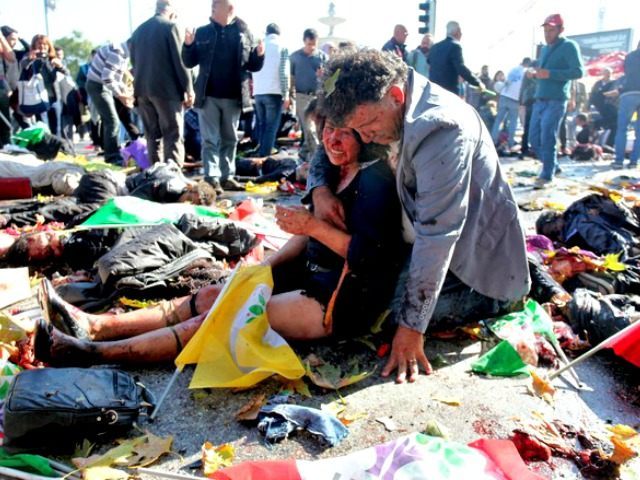A Turkish court has demanded all media stop covering the investigation into the October 10 bombing of a peace rally in Ankara, the deadliest terrorist attack in post-Ottoman Turkish history.
Hürriyet Daily News reported “the ban includes ‘all kinds of news, interviews, criticism and similar publications in print, visual, social media and all kinds of media on the Internet.’” The ban went into effect when the court ruled on it.
Journalists and legal experts condemned the move by the court.
“The decision is against the law, and a violation of rights, and those who have made the decision are in violation of the Constitution,” declared Turkish Criminal Lawyers’ Association President Fikret Ilkiz. “For this kind of a media blackout to be imposed, there must be an ongoing court case and the decision must be made by the court overseeing the case. The Ankara court that made the decision to institute the blackout is in violation of the law and of the constitutionally guaranteed rights to obtain information and to be critical.”
Two bombs exploded in Ankara on October 10 at a pro-Peoples’ Democratic Party (HDP)—a pro-Kurdish group—rally, killing 97 people and wounding hundreds more. It is the deadliest terrorist attack in post-Ottoman Turkey. Only two days later, a massive protest broke out against “the Islamic government for encouraging the anti-Kurdish hate they believe prompted” the attack. President Recep Tayyip Erdoğan has previously made incendiary remarks about Kurds and Jews.
Prime Minister Ahmet Davutoğlu claimed DNA testing from the site connects the bombers to the Islamic State (ISIS/ISIL). However, officials arrested two alleged members of the Kurdistan Workers’ Party (PKK), a Lenin-Marxist group that is considered a terrorist group by the U.S., EU, and NATO.
This is also not the first time Erdoğan and his government have censored all forms of communication. Reports since his time as prime minister have shown the world he does not tolerate any criticism towards his rule. A Finnish journalist confronted Erdoğan at a press conference on October 13, characterizing his reign as a “dictatorship.”
“I have found the opportunity to travel around your beautiful country,” he said. “Unfortunately, some citizens are afraid of you, they claim that you have been ruling your country with dictatorship. At the same time, what is more desperate is that some people have been claiming that the state is involved in the terror attack in Ankara. What do you think about these claims?”
Erdoğan immediately asked for the outlet the journalist worked for before he attempted to deny the valid claims.
“First of all, one should see quite frankly that surely you wouldn’t be able to ask such a question in a country that has a dictator,” he responded. “The second point: you wouldn’t be to insult a country’s prime minister, president or his family without restraint in a country where there is a dictatorship. I’m someone who was elected president by 52 percent of my people a year ago. Who are those people declaring that a person who was elected president by 52 percent of his people’s vote as dictator?”
There are no reports yet of which media outlet the journalist works for or if that outlet will be banned in Turkey.
Turkish outlet Today’s Zaman reported on Wednesday that the Radio and Television Supreme Council (RTÜK) demanded answers from Digiturk satellite about their decision to stop “broadcasting seven TV stations that are critical of the government.” The company said a prosecutor asked them to stop running the stations, including children’s station Yumurcak TV. Turkcell TV+, an online TV streaming service, also stopped broadcasting stations after the Ankara Chief Public Prosecutor’s Office demanded their removal.
The RTÜK members decided to inquire about the move, five votes to four. The four who voted no belong to the Justice and Development Party, which is Erdoğan’s party.

COMMENTS
Please let us know if you're having issues with commenting.